
The Three Stooges were an American vaudeville and comedy team active from 1922 until 1970, best remembered for their 190 short-subject films by Columbia Pictures. Their hallmark styles were physical, farce, and slapstick comedy. Six total Stooges appeared over the act's run ; Moe Howard and Larry Fine were mainstays throughout the ensemble's nearly 50-year run, while the "third stooge" was played in turn by Shemp Howard, Curly Howard, Shemp Howard again, Joe Besser, and "Curly Joe" DeRita.
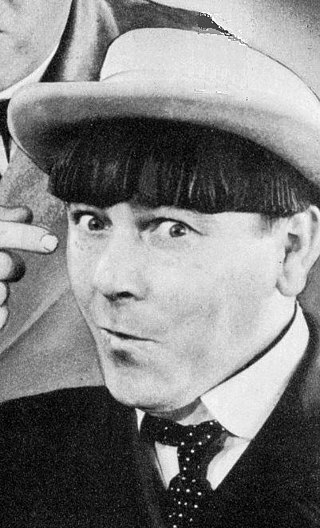
Moses Harry Horwitz, better known by his stage name Moe Howard, was an American comedian and actor. He is best known as the leader and straight man of the Three Stooges, the farce comedy team who starred in motion pictures and television for four decades. That group initially started out as Ted Healy and His Stooges, an act that toured the vaudeville circuit. Moe's distinctive hairstyle came about when he was a boy and cut off his curls with a pair of scissors, producing an irregular shape approximating a bowl cut.

Louis Feinberg, better known by his stage name Larry Fine, was an American comedian, actor, and musician. He is best known as a member of the comedy act the Three Stooges and was often called "The Middle Stooge".
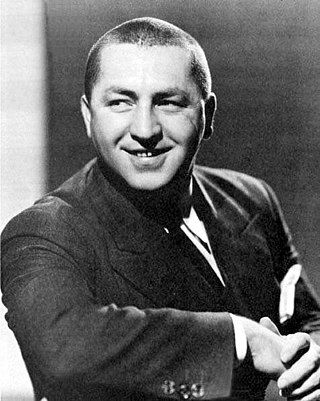
Jerome Lester Horwitz, better known by his stage name Curly Howard, was an American comedian and actor. He was a member of the comedy team The Three Stooges, which also featured his elder brothers Moe and Shemp Howard, as well as actor Larry Fine. In early shorts, he was billed as Curley. Curly Howard was generally considered the most popular and recognizable of the Stooges.

Joseph Wardell, known professionally as Joe DeRita, was an American actor and comedian, who is best known for his stint as a member of The Three Stooges in the persona of Curly Joe DeRita.

The New 3 Stooges is an American animated television series that ran during the 1965–66 television season starring the Three Stooges. The show follows the trio's antics both in live-action and animated segments. The cast consisted of Moe Howard, Larry Fine and Joe DeRita, with actor and close friend Emil Sitka co-starring, as well as Margaret Kerry. The stories took place in varied settings, including Newport Beach and sailing as buccaneers on the Spanish Main.

Joe Besser was an American actor, comedian, and musician, known for his impish humor and wimpy characters. He is best known for his brief stint as a member of The Three Stooges in movie short subjects of 1957–59. He is also remembered for his television roles: Stinky, the bratty man-child on The Abbott and Costello Show, and Jillson, the maintenance man on The Joey Bishop Show.

Swing Parade of 1946 is a 1946 musical comedy film directed by Phil Karlson and released by Monogram Pictures. The film features Gale Storm, Phil Regan, and The Three Stooges, Edward Brophy and musical numbers by Connee Boswell and the Louis Jordan and Will Osborne orchestras, including "Stormy Weather" and "Caldonia".

Have Rocket, Will Travel is a 1959 American science-fiction comedy film released by Columbia Pictures and starring the Three Stooges, consisting of Moe Howard, Larry Fine and new addition Joe DeRita. The film was produced to capitalize on the Three Stooges' late-1950s resurgence in popularity. The supporting cast features Anna-Lisa and Robert Colbert.
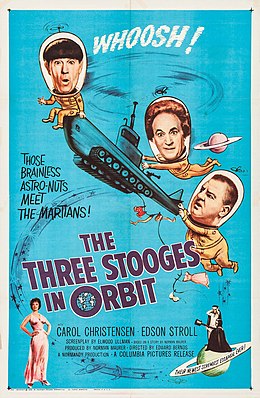
The Three Stooges In Orbit is a 1962 American comedy science fiction film directed by Edward Bernds. It is the fourth feature film to star the Three Stooges after their 1959 resurgence in popularity. By this time, the trio consisted of Moe Howard, Larry Fine, and Joe DeRita. Released by Columbia Pictures and produced by Normandy Productions, The Three Stooges in Orbit was directed by long-time Stooge director Edward Bernds, whom Moe later cited as the team's finest director.

Woman Haters is a 1934 musical short subject directed by Archie Gottler starring American slapstick comedy team The Three Stooges. It is the inaugural entry in the series released by Columbia Pictures starring the comedians, who would ultimately star in 190 short subjects for the studio between 1934 and 1959. This short is known to be the first program shown on Antenna TV, a channel that was launched on January 1, 2011, by Tribune Broadcasting.

A Plumbing We Will Go is a 1940 short subject directed by Del Lord starring American slapstick comedy team The Three Stooges. It is the 46th entry in the series released by Columbia Pictures starring the comedians, who released 190 shorts for the studio between 1934 and 1959.
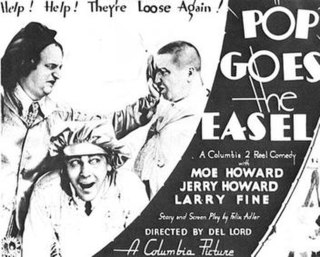
Pop Goes the Easel is a 1935 short subject directed by Del Lord starring American slapstick comedy team The Three Stooges. It is the seventh entry in the series released by Columbia Pictures starring the comedians, who released 190 shorts for the studio between 1934 and 1959.

Oily to Bed, Oily to Rise is a 1939 short subject produced and directed by Jules White starring American slapstick comedy team The Three Stooges. It is the 42nd entry in the series released by Columbia Pictures starring the comedians, who released 190 shorts for the studio between 1934 and 1959.
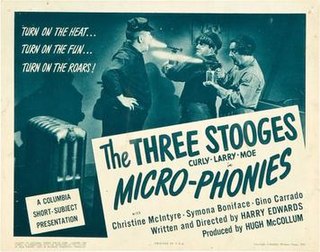
Micro-Phonies is a 1945 short subject directed by Edward Bernds starring American slapstick comedy team The Three Stooges. It is the 87th entry in the series released by Columbia Pictures starring the comedians, who released 190 shorts for the studio between 1934 and 1959.
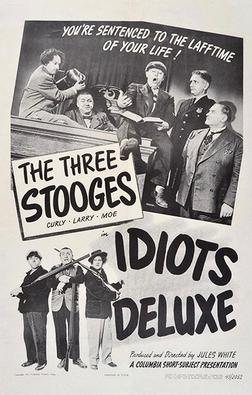
Idiots Deluxe is a 1945 short subject directed by Jules White starring American slapstick comedy team The Three Stooges. It is the 85th entry in the series released by Columbia Pictures starring the comedians, who released 190 shorts for the studio between 1934 and 1959.

Three Loan Wolves is a 1946 short subject directed by Jules White starring American slapstick comedy team The Three Stooges. It is the 93rd entry in the series released by Columbia Pictures starring the comedians, who released 190 shorts for the studio between 1934 and 1959.

G.I. Wanna Home is a 1946 short subject directed by Jules White starring American slapstick comedy team The Three Stooges. It is the 94th entry in the series released by Columbia Pictures starring the comedians, who released 190 shorts for the studio between 1934 and 1959.
Hugh McCollum was an American film producer best known for his credits on Three Stooges short subject comedies.

Three Stooges Scrapbook is an unaired 1960 television pilot starring The Three Stooges. In the opening title and Hollywood trade ads, the show's title is spelled without "The," including a promotional photograph of the Stooges holding an oversized scrapbook. The pilot featured the slapstick trio getting evicted from a rooming house for cooking in their apartment, looking for a new place to live, finding refuge in the home of a mad inventor, and presenting an animated short called The Spain Mutiny that imagines the funnymen as part of Christopher Columbus’ crew.



















